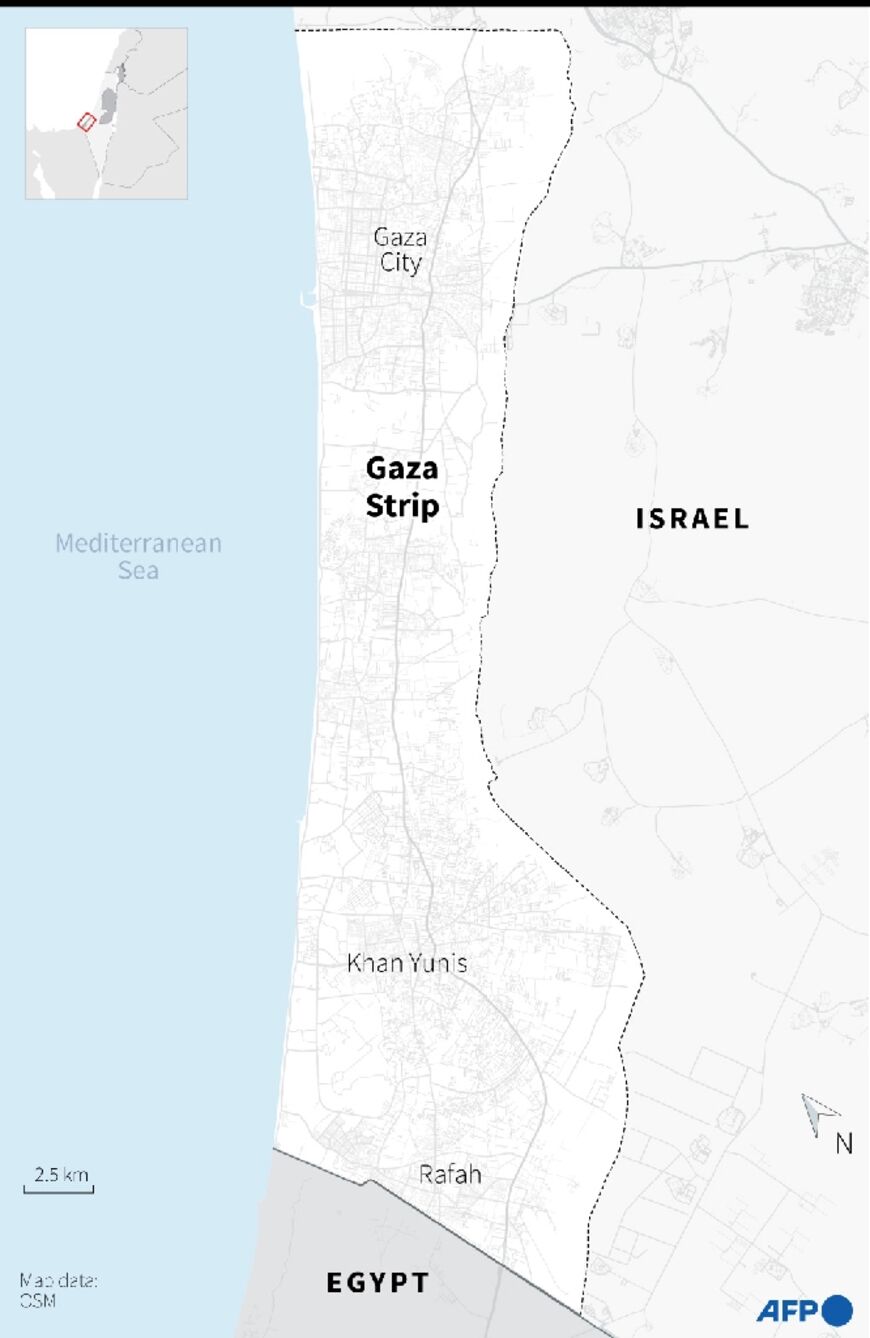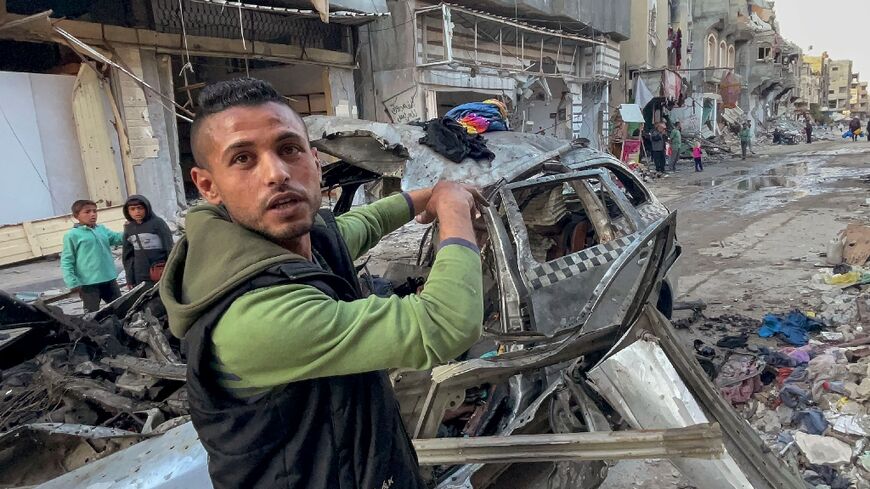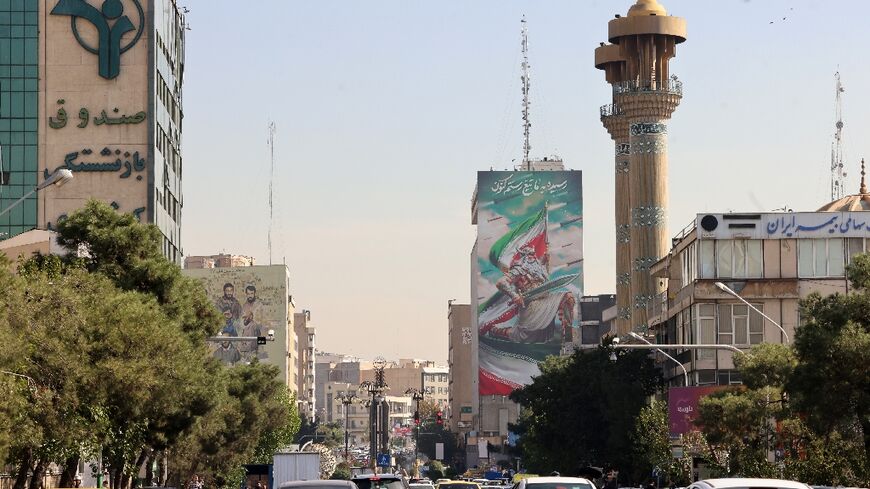Israel pounds Gaza as Iran attack threat puts region on edge

Residents reported heavy Israeli fire in central Gaza on Friday, with regional tensions soaring after Iran threatened reprisals over a strike in Syria this month that killed two Iranian generals.
As talks for a truce and hostage release dragged on, fears that Iran could soon launch an attack on Israel prompted the United States to announce it was sending reinforcements to the Middle East as a deterrent.
US President Joe Biden said he expected Iran to attempt to strike Israel soon but warned it against attacking the US ally in retaliation for the April 1 strike on its Damascus consulate.
Authorities in Hamas-ruled Gaza reported dozens of new air strikes in the central region where most Israeli troops have regrouped in recent days.
Israel's military said its aircraft had struck more than 60 militant targets in Gaza over the previous day.
The Hamas media office said 25 people were taken to hospital in Deir al-Balah "as a result of an air strike on a house".
Mohammed al-Rayes, 61, told AFP that he fled Israeli "air strikes and artillery shelling" in Nuseirat overnight.
"It was all fire and destruction, with so many martyrs lying in the street," he said.
Another resident, Laila Nasser, 40, reported "shells and missiles" throughout the night.
"They will do to Nuseirat what they did to Khan Yunis," said Nasser, vowing to flee to the southernmost city of Rafah, like most of Gaza's population.
- 'Real' threat -
The war began with Hamas's unprecedented October 7 attack against Israel which resulted in the deaths of 1,170 people, mostly civilians, according to Israeli figures.
Israel's retaliatory offensive has killed at least 33,634 people in Gaza, mostly women and children, according to the territory's health ministry.
The latest bombardments in Gaza came after Israel said it had strengthened air defences and paused leave for combat units, following a deadly April 1 air strike that destroyed Iran's consulate building in Damascus.
Iran blamed its arch foe Israel, which has stepped up strikes against Iran-linked targets in Syria since the Gaza war began.
The White House said on Friday that the threat from Iran remained "real".
Asked what his message was to Iran on striking Israel, Biden said: "Don't".
"We are devoted to the defence of Israel, we will support Israel, we will help defend Israel and Iran will not succeed," he said.
A defence official said the Pentagon was "moving additional assets to the region to bolster regional deterrence efforts and increase force protection for US forces."
- 'Shoulder to shoulder' -
Biden sent the head of US Central Command, General Michael Kurilla, to Israel for urgent talks on the threat from Iran.
After meeting Kurilla on Friday, Defence Minister Yoav Gallant said Israel and the United States stood "shoulder to shoulder", despite recent differences over the conduct of the war in Gaza.
"Our enemies think that they can pull apart Israel and the United States, but the opposite is true -- they are bringing us together and strengthening our ties," Gallant said.
Washington, which has had no diplomatic relations with Tehran since the aftermath of the 1979 Islamic revolution, also asked its allies to use their influence with Iran to urge restraint, the State Department said.
After calls with his Australian, British and German counterparts Thursday, Foreign Minister Hossein Amir-Abdollahian said: "Iran does not seek to expand the scope of the war."
But he added that it felt it had no choice but to respond to the deadly attack on its diplomatic mission after the UN Security Council failed to take action.
Lebanon's Iran-backed militant group Hezbollah said it fired "dozens of Katyusha rockets" at Israeli artillery positions Friday, a bombardment it said was in response to Israeli strikes in the south.
The Israeli army said approximately 40 launches were identified, some of which were intercepted. "No injuries were reported," it added.
- French travel warning -
France warned its nationals against travelling to Iran, Israel, Lebanon or the Palestinian territories, after the US embassy in Israel announced it was restricting the movements of its diplomats over security fears.
German airline Lufthansa said its planes would no longer use Iranian airspace as it extended a suspension of flights to and from Tehran.
In their October attack, Hamas militants seized about 250 hostages, 129 of whom remain in Gaza, including 34 the Israeli army says are dead.
The European Union on Friday imposed sanctions on the armed wings of Hamas and Islamic Jihad for "widespread" sexual violence during the October 7 attack.
The bloc said fighters from the two militant groups -- already on the EU's terrorism blacklist -- "committed widespread sexual and gender-based violence in a systematic manner, using it as a weapon of war".
- New crossing for aid -
Washington has ramped up pressure on Netanyahu to increase aid flows to Gaza in the face of UN warnings of imminent famine.
The Israeli army said that an undisclosed number of aid trucks had been allowed to enter Gaza Thursday through a newly opened border crossing into the north of the territory.
"The first food aid trucks entered through the new northern crossing from Israel into Gaza yesterday," the Israeli defence ministry body that oversees Palestinian civil affairs, COGAT, said.
Despite repeated AFP requests for comment, Israeli authorities did not disclose the exact location of the new crossing, which Israeli media reported to be close to the Zikim kibbutz.
Gallant had trumpeted the new crossing on Wednesday, promising to "flood Gaza with aid", but on Thursday the UN Security Council said "more should be done".
burs-jd/kir/jsa









